Drone operators risk mental trauma, says RAF commander
- Published
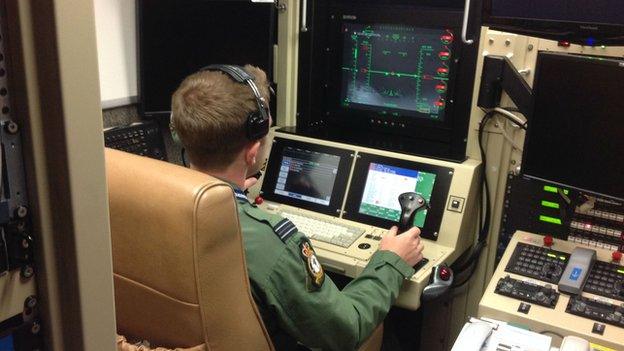
Members of 13 Squadron control the drones from inside containers in an aircraft hangar
Royal Air Force staff operating drone aircraft in Iraq and Syria may be at greater risk of mental trauma than plane pilots, their commander has said.
Long missions and cameras giving clear views of events could cause post-traumatic stress disorder, according to Wing Cdr Damian Killeen.
The unmanned craft perform surveillance over Syria and air strikes in Iraq.
BBC Radio 5 live was given exclusive access to the UK-based personnel running the missions.
'Unique' work
The Remotely Piloted Aircraft System, or Reaper, was first used by the UK in Afghanistan in 2008 for surveillance, and later fitted with weapons.
By March 2015 the UK had carried out some 70 drone strikes against so-called Islamic State (IS) targets in Iraq.
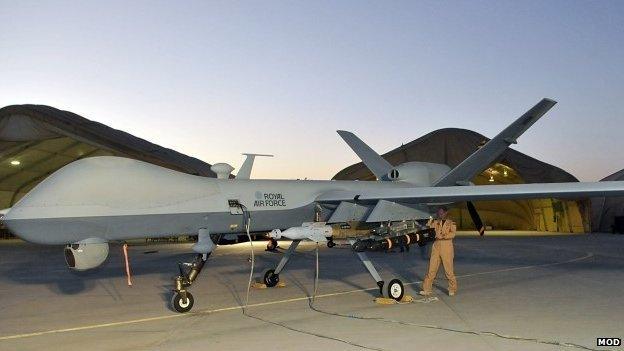
The drones can operate for 16 hours a day
In Syria RAF drones are used only for surveillance - but in July, Defence Secretary Michael Fallon suggested they could be used to attack IS fighters, if MPs agree.
The missions are operated by members of the RAF's 13 Squadron from inside containers in an aircraft hangar in Lincolnshire.
The operators work in shifts, controlling aircraft thousands of miles away. All of them have previously qualified as pilots on other military aircraft.
Describing his place of work, Reaper pilot Flt Lt Tom Maddock said: "It's very unique - it looks odd and it looks different."
But he said the preparation and processes were exactly the same as flying a conventional aircraft.
"Coming in the box, shutting the door, an enclosed space - it puts you psychologically in that airspace," he said.
"If you're talking about the end state of deploying weapons then the emotions and thought processes that go behind it are exactly the same."
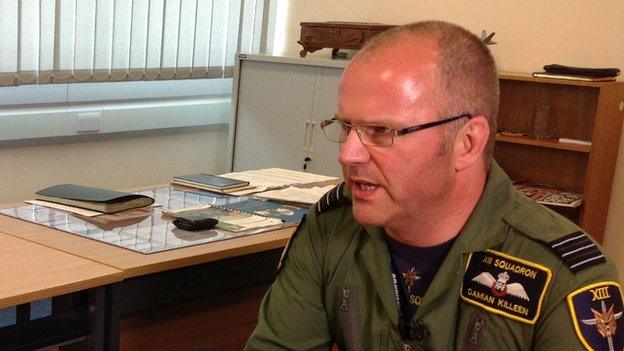
Wing Cdr Damian Killeen described how hard watching events on the ground could be
Wing Cdr Killeen said the potential for psychological and emotional impact on drone operators was "far greater than it ever was with a manned cockpit".
"You've got that resolution where you know exactly what it is that's on the other end of your crosshairs," he said.
"Reaper has that resolution but it's magnified by the fact that we're airborne for hours and hours and we don't do four-month tours."
Instead, he said, it was an all-year-round job, adding: "That's where the greater potential for this [post-traumatic stress disorder] comes from."
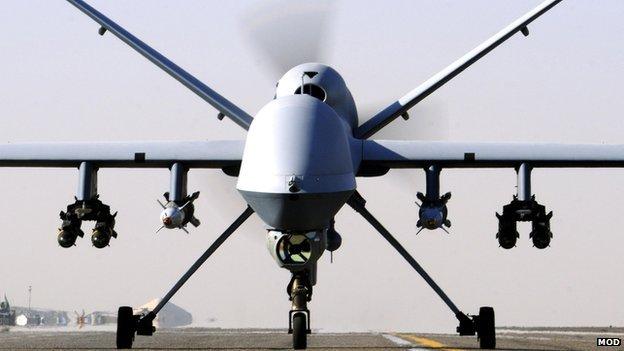
The Reaper was first used by the UK in Afghanistan in 2008 for surveillance
Drone aircraft can operate for 16 hours a day, operated by crews on two eight-hour shifts. Every crew member must have a break after three hours.
The shift pattern for crews is almost identical to that of pilots flying conventional aircraft, an RAF spokesman said. The difference is the amount of time the aircraft is in the air, with a Tornado, for example, flying for a maximum of eight hours.
'Video games'
They sit in front of computer screens with controls in front of them, but the operators denied that flying a drone was in any way similar to playing a computer game.
"I'm not very good at video games, actually," said Flt Lt Maddock.
"This is about as different as it gets from that.
"It's a heavy responsibility that we take very seriously. We don't want to make the mistake."
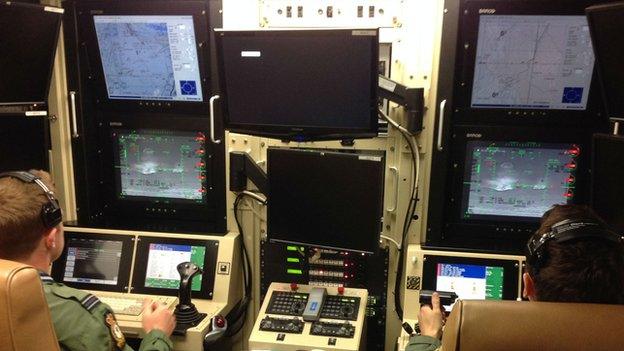
Flt Lt Tom Maddock said flying drones was "psychologically" similar to flying planes
Wing Cdr Killeen said 13 Squadron staff were well aware of the realities of what they see on screen.
"The bits that hurt more are the days where you watch people die because we are in a surveillance mode," he said.
"For example, we will be in surveillance mode and the guys you are protecting stand on an improvised explosive device.
"There's nothing you could have done about it, but you're seeing it and you can't turn away from it, because we are the ones that are broadcasting that scene to the commanders who are co-ordinating the recovery, so we have to keep watching."
Wing Cdr Killeen added that the RAF offers support to all air crew to mitigate the effects of any potential mental trauma.
- Published3 July 2015
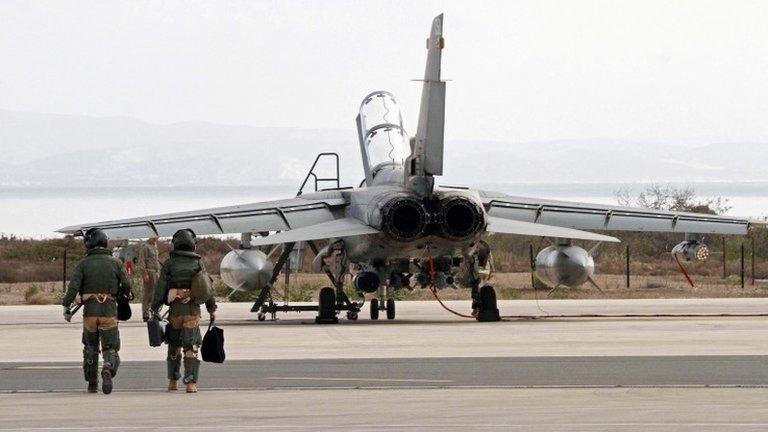
- Published19 December 2014
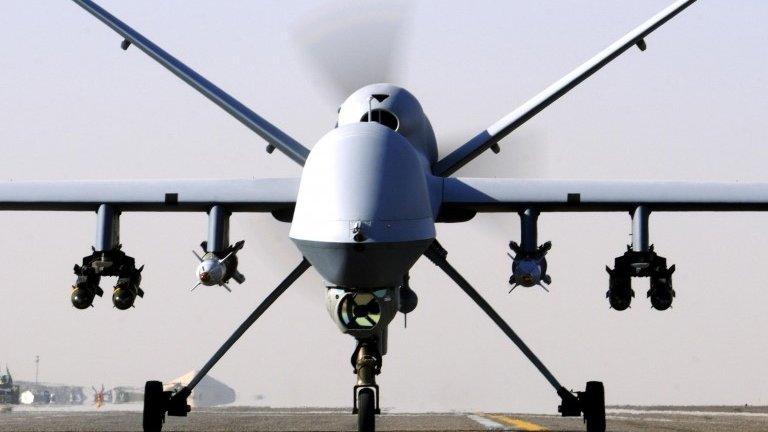
- Published29 July 2014
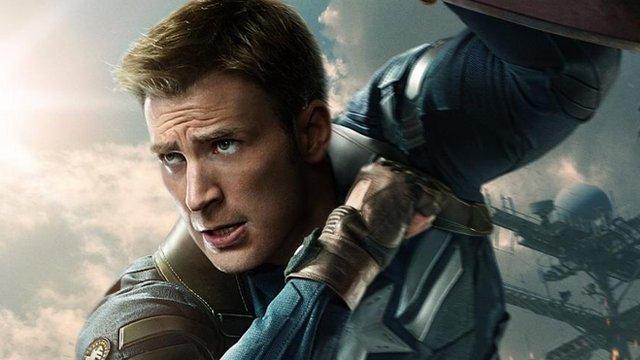
- Published31 January 2012